Are you planning a basic cleaning after the summer and would like to properly clean your windows in fall? Here are some helpful methods you can use to keep glass panes clean in the rain, sun, or frost during the cool season!
Before it gets really cold and rainy, you can clean your windows in fall in a cheap way. There are various cleaning techniques and home remedies that can be used to easily keep such areas in your home clean. Regular maintenance and care are important for windows in preparation for the winter season in order to maintain their optimal function. To make this task not too difficult for you, you can find some practical and helpful cleaning tips below.
What Should You Consider When Cleaning Windows in Fall?
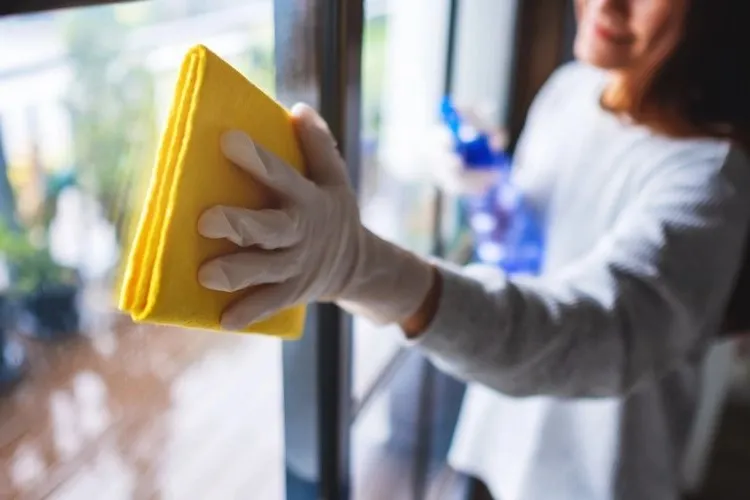
The windows in your home often have dirt due to frequent rains, dust, pollen, exhaust fumes or snow, and the like. Despite regular window cleaning, consistently shiny and transparent glass panes seem to be a difficult goal to achieve without professional cleaning. Luckily, you can do this without having to use any special tools and by following some simple steps and trying clever tricks. Before you do this, however, it is advisable to choose the appropriate time and consider some of the following influencing factors.
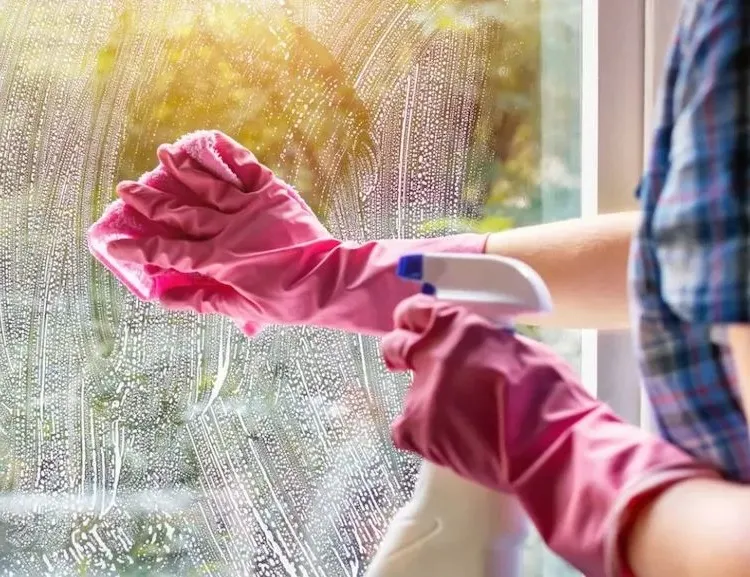
- In general, you should clean your windows in fall or spring, although twice a year is generally sufficient.
- To prevent damage from dust, rain or other factors, the right weather for this cleaning task is a crucial factor. This usually excludes winter and summer, as there should be no frost, sub-zero temperatures or strong sunlight when cleaning windows.
- In cold and frosty conditions, water can freeze during cleaning, while cleaning solutions on window panes can dry too quickly in hot weather. In both cases, this leads to unsightly spots and streaks, and sometimes damaged surfaces. Therefore, fall or spring are usually the optimal seasons for such cleaning work, depending on the outside temperature and strength of the sun.
Which Cleaning Tool to Use When Cleaning Windows?
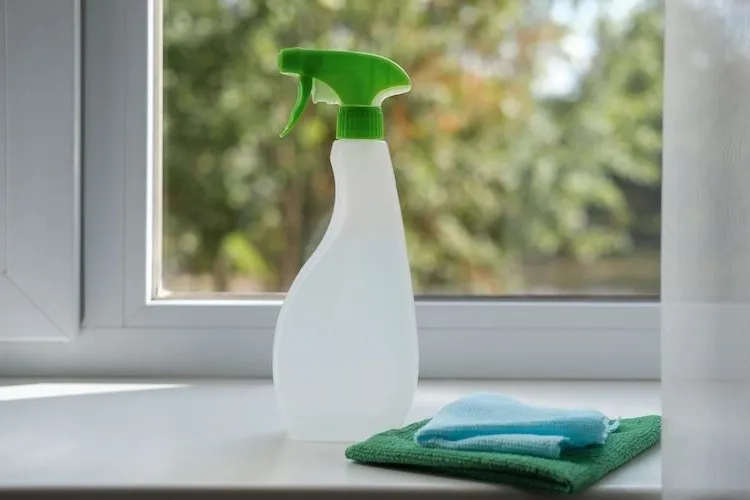
As with any other household cleaning task, it is important to protect your skin, respiratory tract and eyes with rubber gloves, eye protection and a mask. Otherwise, in normal weather conditions, you can use warm water and an all-purpose cleaner as a basis for cleaning windows. Add a little more dish soap or the all-purpose cleaner to a bucket. After you’ve made the cleaning solution in the bucket, you can prepare a second container of clean water for wiping. Otherwise, some of the following simple cleaning products and techniques are suitable:
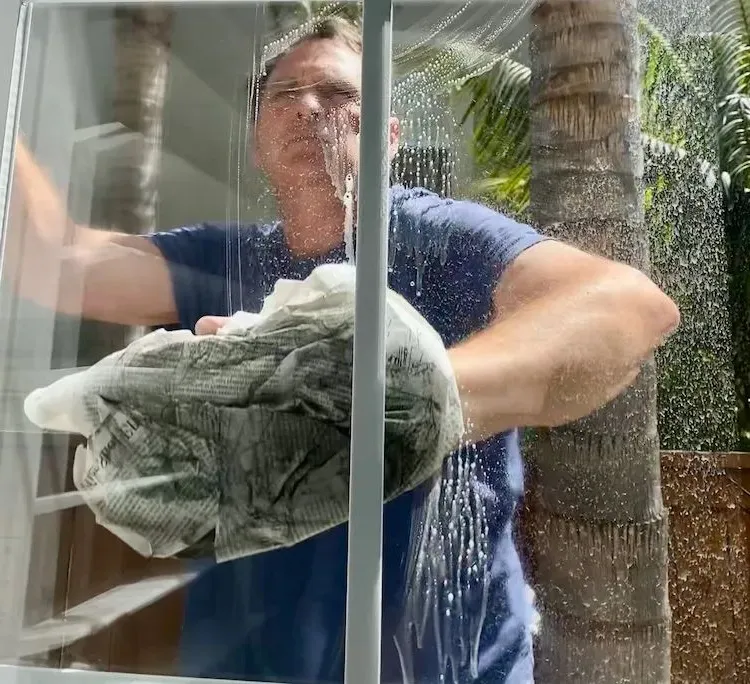
- For your own safety, try working from the ground and use telescopic poles if necessary.
- When using a ladder, make sure to position it stably and ensure that the angle is correct.
- It is also important to wear sturdy, closed-toe shoes to minimize the risk of slipping.
- Avoid using aggressive cleaning agents when cleaning windows, as corrosive, abrasive and solvent-based products can damage the glass surface. A high surfactant content in special cleaners can also make the glass milky and leave greasy streaks.
- Wipe your window panes with a soft cloth or non-abrasive sponge, or use kitchen paper or newspaper to dry them. However, with newspapers, be careful not to leave any black spots from the printing ink.
- Soak stubborn dirt like bird droppings with paper towels soaked in water to prevent scratches when wiping. Also use the non-abrasive side of the sponge.
- Use an old toothbrush to carefully clear the areas between the glass and the window frame of any build-up of dirt, and use a vacuum cleaner to remove cobwebs and leaves. This also applies to cleaning blinds, and practical window wipers are of course also suitable for preventing condensation or fogging.
What Home Remedies Can You Use When Cleaning Windows in Fall?
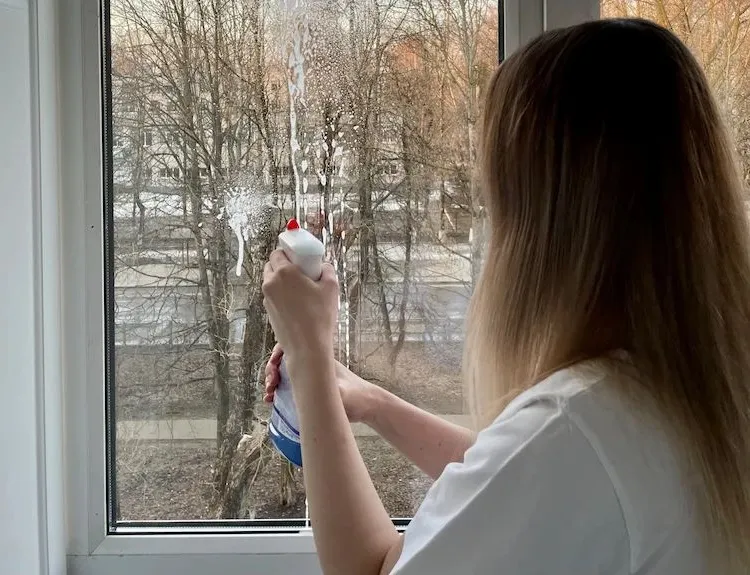
Every time you try to clean windows or glass surfaces, fingerprints or other residues are left behind. Achieving the desired shine can often be a real challenge. Some affordable and easily accessible household supplies are perfect for cleaning and preparing windows for the winter season. Just check out the following methods that you can easily try yourself at home.
How to clean PVC window frames naturally? 4 easy home methods

- Use vinegar when cleaning windows – When it comes to efficiency, vinegar is the first helper in the household, although the home remedy is also suitable for window panes. For such a cleaning solution, you only need 2–3 tablespoons of it per 1 liter of hot water. Mix the two ingredients together and use a spray bottle when cleaning your windows in fall. Using vinegar not only helps remove stubborn dirt, but also ensures faster drying and does not leave streaks or drips on the glass. However, if you use citric acid or vinegar, make sure they do not come into contact with window frames as this could cause damage.
- Use Iodine as a Window Cleaner – This may sound strange, but try a cleaning method using iodine. Mix 50 ml of it with two litres of water and pour the cleaning solution into a spray bottle for easier use. Iodine can be used to easily remove stains that even cleaning products are unable to combat.
- Using potato water as a natural cleaning solution to clean windows in fall – Another effective remedy that you can add to the list of alternative cleaners is potato water. To use it, you can pour boiling water over clean potato peels and soak them in. Wait until the water has cooled down and then fill a spray bottle with it again. Use paper towels or newspaper to restore your window panes to their former shine.
Clever Trick for Windows to Stay Clean for Longer in Cold Seasons

Ethyl alcohol, glycerin and ammonia can be used to protect your windows from dirt build-up for longer periods. This is a tested hack that many people rely on when cleaning windows in fall. The hack ensures that the glass panes remain clean even until spring, although it is advisable to carry out the procedure in dry weather. Ammonia helps against stubborn contamination, while glycerin has a water-repellent effect.
Also read: The 7 Mistakes to Avoid When Cleaning Windows: Make Them Crystal Clear
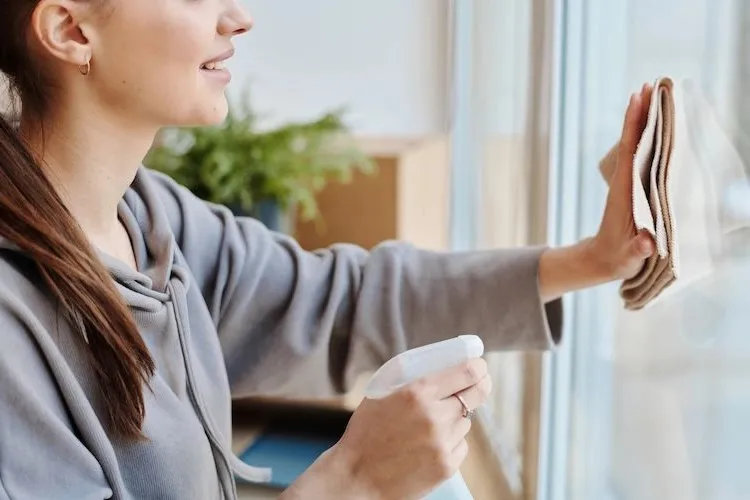
- To prepare the solution you will need 100 ml of glycerin, 50 ml each of rubbing alcohol and ammonia, and about 200 ml of water. The amounts may vary depending on the area.
- Mix all the ingredients and use them on a clean, soft cotton cloth to polish the windows in circular motions.
- Remove any residue and treat the glass surface with the solution to form a thin protective film.
- This cleaning method prevents dust from quickly accumulating on the window panes or stains from raindrops remaining on them after rainfall.
Also read: Household Tricks with Cooking Oil
